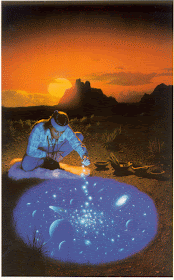I finally got around to visiting the Mütter Museum with my friends Jen and Tim this weekend. All three of us are big fans of John Hodgman and Sarah Vowell, each of whom mention the megacolon in their respective writings. We'd been looking forward to this for a long time.
My friend Frederick is also a fan of the place. He had a poster from the museum in a frame that was clearly many times more expensive than the poster.
En route, we played 20 questions.
The answers were:
- A unicorn
- An elbow
- Lucas Lee
- A cactus
- The TARDIS
- Lindsay Weir
We parked for five dollars, which was pretty cheap, and walked a couple blocks to the museum. It was a bit different from what I was expecting.
- It was quite a bit smaller than I thought it would be: Just three rooms. Nicely laid out and everything, but that couldn't change how small the place was.
- Very well lit: I was expecting to be the kind of place the Franklin Institute was before it was renovated, with expansive, dimly lit halls. But the lighting was very good.
- Body parts: I've got a decent general science education, but I'm not a doctor or a biologist, and my last experience with body parts was dissecting a fetal pig more than a decade ago.The thing that struck me is how much smaller the organs were than I was expecting them to be, the brains in particular. Zombie movies have lied to me!
- Accessible: I enjoy science museums, but I do think they cleave much more closely to entertaining than informing. Mütter was no exception, but I thought the exhibits were accessible without being patronizing or simplifying the material to the point of meaninglessness.
- No pictures allowed: I had to resort to a stock photo of the megacolon! #Firstworldproblems
- The Megacolon: It wasn't as mega as we were led to believe. We were hoping we could walk through it like the giant heart at the Franklin Institute.
- Skullduggery: There was a wall with a good 40 or 50 skulls on it, As a lay person, I tend to think of skulls as pretty uniform, but seeing so many in one space, I couldn't help but notice the significant amount of variation visible even at a causal glance.
- Skullduggery, part two: They had a forensics of Grimm's Fairy tale theme going on in the upper gallery and I really liked one of the paintings that went with it.
Afterwards, we had some lunch, because seeing dozens of anencephalic fetuses in jars really works up an appetite. Afterwards we visited Fat Jack's Comic Crypt and had some gelato at Capogiro's, which was voted the best ice cream in the world by National Geographic. It was pretty yummy. I'm not sure if I've ever had gelato before. I thought it was vegan, but apparently not.
Great visit all around. Next time we return to Philly, it will be to camp in at the Franklin Institute.




















